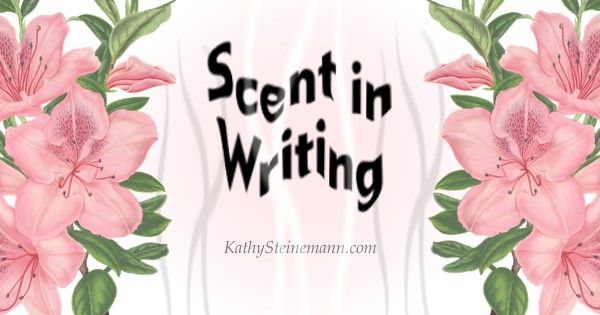
Why Should You Incorporate Scent in Your Prose or Poetry?
Our brains associate scent with memories. The whiff of an orchid might remind a woman of her senior prom, reawakening visceral recollections of music, embarrassment over a zipper that popped open at an inopportune moment, or the adrenaline rush of a passionate kiss behind the bleachers.
A pine freshener hanging from the rearview mirror of a taxi could flood a passenger with memories of a drive into the desert to ditch the corpse of an ex-lover. The memories might be so strong that he wets his pants or hears the non-existent screams of his dying victim.
Use scent to your advantage. Spritz aroma throughout your writing, as you might air freshener in a stale room, to stimulate readers’ olfactory centers.
Alternative Nouns for Scent
The word aroma conveys an impression of something pleasant, whereas smell could refer to unpleasant scents. Choose carefully. The difference between fragrance and stench can reverse the undertone of a passage.
Select a word, such as one of the following, that fits the situation.
A to W
aroma, attar, aura, balm, bouquet, distillate, essence, fragrance, hint, perfume, pong, redolence, reek, smell, spoor, stench, stink, suggestion, tang, tinge, trace, trail, undertone, waft, whiff, whisper
What Produced the Smell?
Her hair smelled like bubblegum mixed with cotton candy.
A coppery stench oozed from the wound.
His bacon breath turned her stomach.
Why would bacon turn someone’s stomach? Story prompt?
The air was laced with smells that spoke of [insert an appropriate noun].
The following Pleasant and Unpleasant lists contain words you could include in direct comparisons. Transform nouns into adjectives by adding appropriate suffixes, or, if appropriate, insert as is. What seems pleasant to you could nauseate your protagonist, so you might want to switch some of the words.
Pleasant, A to F
air-dried sheets, angels’ breath, anise, baby powder, baby’s breath, bacon, bananas, bubblegum, cedar, chamomile, chicken broth, chocolate, cinnamon, citrus, cocoa, coconut, coffee, cork, cotton candy, eucalyptus, flowers, a forest, fresh air, freshly baked bread, fruit
Pleasant, G to Y
Grandma’s kitchen, grass, hand cream, hand sanitizer, honey, leather, lemon, licorice, lilacs, lime, maple sugar, a meadow, mint, ocean breezes, oranges, peaches, pine, pineapple, a pizzeria, popcorn, roses, scented soap, strawberries, a summer day, toast, vanilla, violets, wine, the woods, yeast
Unpleasant, A to H
acetone, bad breath, a barnyard, bat guano, burning lint, a burning tire, camels’ breath, a cat box, a cemetery, a chicken coop, chlorine, cigars, cleaning fluid, copper, a corpse, decomp, a dog, dog breath, fish, fresh paint, funky fungus, a garbage dump, garlic, greasy rags, green bacon, hair dye, a hospital, hot tar
Unpleasant, K to V
kitty-litter, a laundry hamper, a locker room, medicine, metal, mildew, mold, moldy dentures, nicotine, onions, pepper, plastic, rancid butter/cheese, ripe socks, rotten potatoes, a rotting whale carcass, scorched rubber, seaweed, a sewer, a skunk, smoke, stringent soap, sulfur, sweat, tobacco, toe jams, vinegar
The Writer’s Lexicon series
and additional resources on my Facebook page.
Describe Scents With Well-Chosen Adjectives
If you’re writing a horror novel, you can create a feeling of suspense by foreshadowing. Contrast and compare. Maybe your monster has a delicate woodsy aroma that lures its victims deep into a musty lair where it dissolves the flesh from their bones with a caustic venom that reeks of corpses and singed hair.
Make a romance steamier by including adjectives such as sweaty, masculine, intoxicating, and spicy.
A to D
acetic, acid, acrid, airy, ambrosial, antiseptic, aromatic, balmy, bitter, biting, bland, briny, burnt, caustic, clean, clear, comforting, cool, crisp, cutting, damp, dank, decaying, decomposing, delicate, dirty, distinctive
E to M
earthy, elusive, exhilarating, faint, feminine, fetid, fishy, floral, flowery, forceful, foul, fragrant, fresh, fusty, gamey, gaseous, gentle, giddy, heady, heavy, intoxicating, invigorating, light, loamy, malodorous, masculine, mild, moist, musky, musty
N to R
nauseating, new, odorous, overpowering, piquant, pleasant, polluted, potent, pungent, putrescent, putrid, rancid, rank, redolent, refreshing, repulsive, rich, rotten
S to W
savory, sharp, sickly, smelly, sour, spicy, spoiled, squalid, stagnant, stale, sterile, stinking, strong, stuffy, subtle, sweaty, sweet, tainted, tangy, tantalizing, tempting, thrilling, tart, unclean, understated, uninteresting, wholesome
A Few Objects and Places That Help Incorporate Scent in Writing
B to W
breath, clothing, elevators, feet, hands, hair, money, old books, pets, seating places, vehicles, weather, food, public transit, plants, wooden objects
Wax Creative
He stank like a conservative, she like a liberal.
He reeked of desperation.
The storm swept in with a roiling stench of fresh blood and burning bodies.
Agonizing odors smothered the battlefield, emanating unfulfilled dreams and fresh blood.
Something Might Have No Smell
F to U
flat, fragrance-free, inodorous, neutral, odor-free, odorless, scentless, unscented
Lack of Scent Can Create Suspense
The tracker sniffed the footprints. Why could he detect nothing but moss and pine and fear? Only a moon-gloxx could leave such spoor.
Tabitha’s translucent form shifted and hovered above the bed, bereft of substance and scent.
The Writer’s Lexicon series
and additional resources on my Facebook page.
Discover more from KathySteinemann.com: Free Resources for Writers
Subscribe to get the latest posts sent to your email.

These lists are so helpful, thank you Granny!
Thanks, Kate!
Next week: Over 300 Onomatopoeic Sound-Words.
I love these lists that you compile. Thanks!
Thank-you David. I love doing them. Do you have any words you’d like me to tackle?
I’d have to go through everything you’ve posted; chances are good that whatever I need is already here.
Have you ever compiled these in an ebook? I’d love to have them on my nook.
You must have read my mind. Not yet, but eventually that’s where they’ll go. The book will have even more words. In the meantime, all the lists are posted at:
http://kathysteinemann.com/Musings/category/word-lists/
I just remembered that my first editing passes often include removing someone sighing.
Everyone’s always sighing.
::sigh::
I’d love a list that tackles this four letter word.
I’ve added it to my to-do list. Thanks for the idea!